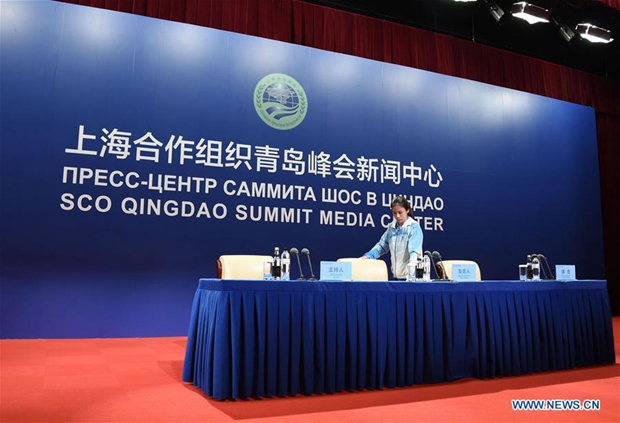First SCO summit with India and Pakistan could inspire amity
- By Sajjad Malik
 0 Comment(s)
0 Comment(s) Print
Print E-mail China.org.cn, June 9, 2018
E-mail China.org.cn, June 9, 2018

The 18th Shanghai Cooperation Organization (SCO) summit will soon bring together leaders of eight member countries for its annual top-level meeting to discuss a myriad of regional and global issues and seek remedies based on consensus. Chinese President Xi Jinping will chair the meeting being held from June 9 to 10 in Qingdao, a coastal city in eastern China's Shandong province.
The occasion is truly historic, being the first summit after India and Pakistan became full members of the SCO last year. It shows that the group has come a long way since its launch 17 years ago.
The full members today include China, Kazakhstan, Kyrgyzstan, Russia, Tajikistan, Uzbekistan, India and Pakistan. Four others – Afghanistan, Belarus, Iran, and Mongolia – have the status of observers.
China has been the moving spirit behind the idea of the SCO and has kept it well on track since its inception. The size as well as the influence of the SCO has increased manifold, but they have not lost focus on the long-term aim of peace and prosperity for all.
After making solid gains, now is the time for the SCO to work with full concentration on achieving their key objectives while steering through the problems faced by the member countries.
As the group has become bigger in size, so has its challenges. One of the key issues now is how to integrate into its fold rivals India and Pakistan, which have clashed in three full-scale wars and several border skirmishes. Even as the leaders of the two nuclear-armed rivals prepare to rub shoulders with other leaders in China, their armies are firing on each other in the divided region of Kashmir.
An effort was made by the two countries ahead of the summit to restore a 2003 ceasefire agreement which has been left in tatters due to scores of violations, for which each side blames the other. There have been reports of violations even after last month’s decision to restore it, but their ferocity and intensity has decreased considerably.
A big question is whether the SCO will be able to exercise a sobering influence on Pakistan and India and prod them to sit together and address all outstanding differences, including the core dispute of Jammu and Kashmir.
There is no easy answer, as normally multilateral groupings avoid dragging bilateral differences into their formal discussions. But the systems of the SCO provide several opportunities and platforms to have bilateral interactions.
For example, leaders from Pakistan and India met on the sidelines of the 2015 SCO summit in Ufa, Russia and decided to hold talks on different issues. But unfortunately, the process was halted due to differences on procedural matters.
The SCO also brought together officials of its member states in Islamabad last month, where they discussed the issue of terrorism. The members exchanged ideas and agreed to combine efforts to tackle the threat.
Another unique opportunity for resolution being offered by the SCO is a joint military drill later this year. It will be the first time that troops from Pakistan and India will come together in such a setting and take part in the joint military maneuvers.
The Qingdao summit presents an occasion to all members to forget about bilateral differences and forge a closer bond, promote cooperation and set an example of a new type of international relations based on mutual respect, cooperation, fairness and justice.
The agenda of the summit also seeks to reinforce the “Shanghai Spirit” and make a mutual pledge to fight against the "three evil forces" of terrorism, extremism and separatism, as well as issues like drug trafficking and cybercrime.
The members are also expected to ratify a five-year outline for the implementation of the Treaty on Long-term Good Neighborliness, Friendship and Cooperation, as well as to approve more than 10 deals covering areas including security, economy, and people-to-people exchanges.
All this, if followed with honesty, will ultimately result in bringing all members closer, including India and Pakistan. The South Asian rivals will have to address their bilateral differences; otherwise they will not be able to move along the SCO and serve the roles expected from each member.
Sajjad Malik is a columnist with China.org.cn. For more information please visit:
http://m.formacion-profesional-a-distancia.com/opinion/SajjadMalik.htm
Opinion articles reflect the views of their authors, not necessarily those of China.org.cn.





